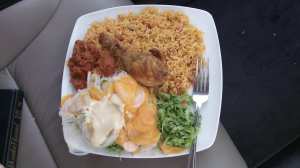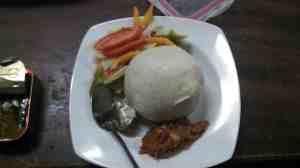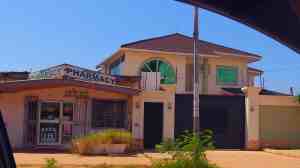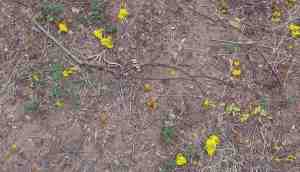It’s been a great few days of settling in here. The transition has been more smooth than my first visit here. That is certainly thanks in part to my wonderful collaborators/hosts Saddik and Berthi, who said “I don’t want you calling me telling me you have a stomachache or a fever!”, so they are watching over me very carefully. And thanks to Berthi for feeding me jollof rice, fufu, and banku.


Over the weekend, I went to church with Berthi. After the service, everyone stayed around and chatted for a few more hours. No rushing here. It was a great chance to finally get to talk to Berthi more in depth about her experience as a teacher, what struggles she faces, and what she hopes for. We took a walk (in the scorching sun) and chatted for quite a while. She was formerly a teacher and is now one of the District Science Coordinators, which means she oversees a group of science teachers, providing them technical and pedagogical help. It’s great that such a position exists. She shared the financial frustrations that teachers face and her desire that she and her teachers could learn more practicals.
After our walk, we come back to talk with other members of the congregation. We shared that I was here to help put on a workshop, people very kindly welcomed me, and we greeted the next set of people. When we began talking to one person however, he immediately starting shaking his head and sharing his skepticism that anything would be able to change the education system here, aside from increasing pay for teachers. Right now, (according to him) people generally don’t choose to become teachers unless they don’t have other options.
His skepticism caught me off guard. Generally people simply welcome me and wish me a nice time here. Also, I am used to hearing opinions on the other end of the spectrum. As an instructor of D-Lab:Education, we are constantly receiving requests from various communities to work with them and having to turn down a majority of them due to lack of manpower and funding.
Another person I talked to the next day shared similar skepticism. He said that even if we show that you can cheaply buy materials for these activities, teachers still may not actually do them. He said he’s not sure why – that’s just his feeling – maybe laziness, maybe a belief that the school should pay for everything and provide it to them.
I’m left with this impression: People are skeptical that science education will change but they wish they were wrong.
I wonder if the skeptics would change their minds if they saw for themselves what is possible with local materials? Or if they themselves experienced understanding a difficult concept through the use of tactile tools?
It is great to have people bring up the issues they see rather than sugarcoat it, as would happen if I only spoke with our collaborators. It forces us to think more carefully about our work and what questions we should test. Let’s see what happens when we gather a bunch of “early adopters” together in one room for three days and where things lead. Maybe the skeptics will eventually get on board as well.
On a final note, I’ve been wandering around to pharmacies, supermarkets, and roadside shops to collect materials to use in our workshop. I’ve also been the crazy white girl picking flowers off the ground for science experiments…


Our workshop in collaboration with the Ghana Association of Science Teachers- Greater Accra Branch starts tomorrow! I’m very excited for the possibilities of what can happen, but also feeling the nervousness that comes with uncertainty.